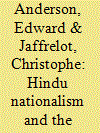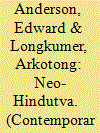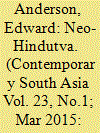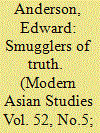|
|
|
Sort Order |
|
|
|
Items / Page
|
|
|
|
|
|
|
| Srl | Item |
| 1 |
ID:
165241


|
|
|
|
|
| Summary/Abstract |
This in-depth interview with Professor Christophe Jaffrelot – one of the world’s most distinguished, prolific, and versatile scholars of contemporary South Asia – focuses on his first area of expertise: Hindutva and the Hindu nationalist movement. In conversation with Dr Edward Anderson, Jaffrelot considers the development of Hindutva in India up to the present day, in particular scrutinising ways in which it has evolved over the past three decades. The discussion explores the diversity of Hindu nationalism and how the movement and ideology have spread beyond the purview of the RSS into various new spaces and normalised, vernacular expressions of ‘neo-Hindutva’. The interview also reflects on recent tensions involving vigilantism and the banalisation of Islamophobia and anti-Dalit violence, and considers what Hindutva’s current proliferation will mean for the future of Indian democracy.
|
|
|
|
|
|
|
|
|
|
|
|
|
|
|
|
| 2 |
ID:
165235


|
|
|
|
|
| Summary/Abstract |
The start of this century has seen Hindu nationalism emerge as a more dominant force than ever before. Hindutva is also evolving and shifting in new, surprising, and significant ways, requiring us to reassess and reframe prevailing understandings. This special issue seeks to identify and understand the ways in which Hindu nationalism increasingly permeates into new spaces: organisational, territorial, conceptual, rhetorical. It develops and expands on the idea of ‘neo-Hindutva’: ‘idiosyncratic expressions of Hindu nationalism which operate outside [or on the peripheries] of the institutional and ideological framework of the Sangh Parivar’ [Anderson, Edward. 2015. “‘Neo-Hindutva’: The Asia House M.F. Husain Campaign and the Mainstreaming of Hindu Nationalist Rhetoric in Britain.” Contemporary South Asia 23 (1): 45–66]. The scope of the articles in the special issue reflects the diversity of contemporary Hindutva, which appears simultaneously brazen but concealed, nebulous and mainstreamed, militant yet normalised. They cover a wide range of topics and places in which we can locate new forms of Hindu nationalism: courts of law, the Northeast, the diaspora, Adivasi communities, and the internet. The special issue also includes an in-depth interview with Christophe Jaffrelot and a postscript by Deepa Reddy. These interventions, we hope, go some way to helping us make sense of contemporary Hindutva.
|
|
|
|
|
|
|
|
|
|
|
|
|
|
|
|
| 3 |
ID:
139622


|
|
|
|
|
| Summary/Abstract |
This paper re-evaluates certain core understandings of Hindu nationalism in Britain through the analysis of a disputed 2006 art exhibition in London. It considers the two main protagonists objecting to the M. F. Husain show: the representative umbrella organisation, the Hindu Forum of Britain, and the web- and protest-based group, Hindu Human Rights. In particular, the paper considers the relationship between these groups, the government, and the Hindu nationalist movement in India. The central role played by performative tropes of outrage and offence in the public representation of Hinduism is explored. It is argued that a reconceptualisation of diasporic Hindutva is required. Firstly, whilst still connected to India in various ways, Hindu nationalism in Britain has outgrown the institutional and ideological boundaries of the Sangh Parivar. It is proposed that these idiosyncratic inflections of transnational Hindutva might be termed ‘neo-Hindutva’. Secondly, it is suggested that the M. F. Husain protests, and subsequent activities of the Hindu Forum, indicate that Hindutva has become mainstreamed and normalised in the UK. Whilst elements of this narrative are distinctly domestic, we must also understand the transnational context which is intrinsically linked, discursively and practically, to India.
|
|
|
|
|
|
|
|
|
|
|
|
|
|
|
|
| 4 |
ID:
161701


|
|
|
|
|
| Summary/Abstract |
During the Indian Emergency (1975–77) a range of opposition groups and the Indian state competed to mobilize the Indian diaspora. The Emergency therefore needs to be understood as a global event. Opposition activists travelled overseas and developed transnational networks to protest against the Emergency, by holding demonstrations in their countries of residence and smuggling pamphlets into India. They tried to influence the media and politicians outside India in an effort to pressurize Indira Gandhi into ending the Emergency. An important strand of ‘long-distance’ anti-Emergency activism involved individuals from the Hindu nationalist movement overseas, whose Indian counterparts were proscribed and imprisoned during the period. Several key Hindutva politicians in recent decades were also involved in transnational anti-Emergency activism, including Subramanian Swamy and Narendra Modi. The Rashtriya Swayamsevak Sangh's role in opposing the Emergency—particularly the way in which it enabled overseas Indians to act as ‘smugglers of truth’—remains an important legitimizing narrative for Hindu nationalists. Indira Gandhi's Congress government mounted its own pro-Emergency campaigns overseas: it attacked diasporic opposition activists and closely monitored their activities through diplomatic missions. The state's recognition of the diaspora's potential influence on Indian politics, and its attempts to counter this activism, catalysed a long-term change in its attitude towards Indians overseas. It aimed to imitate more ‘successful’ diasporas and began to regard overseas Indians as a vital political and geopolitical resource. The Emergency must be reassessed as a critical event in the creation of new forms of transnational citizenship, global networks, and long-distance nationalism.
|
|
|
|
|
|
|
|
|
|
|
|
|
|
|
|
|
|
|
|
|